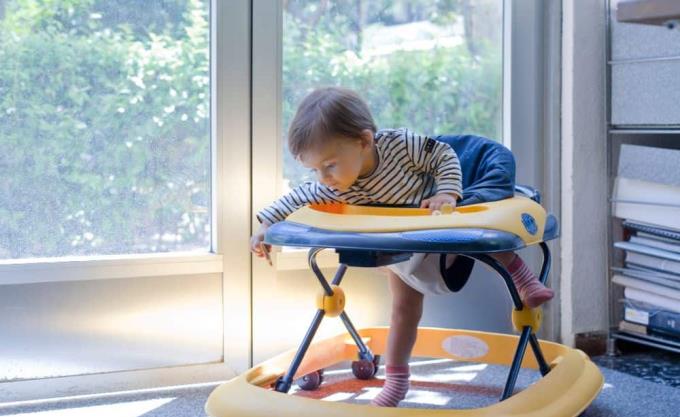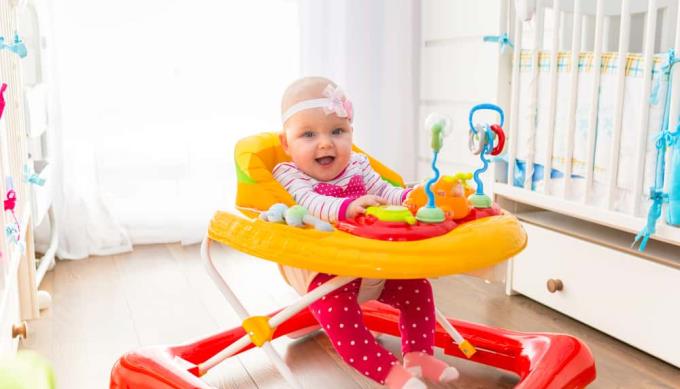Ways to determine an infants caloric needs

Learn how to determine your baby’s caloric needs, including the calories in breast milk and formula, to ensure your infant gets the right nutrition for healthy growth.
Seeing their children step into the stage of learning to walk, many parents rushed to buy a toddler walker. However, there is also a lot of information that shows that using this assistive device not only brings no benefits but can also harm the baby.
Certainly many parents feel extremely happy when witnessing their toddler taking the first steps. This is also a sign that your baby is beginning to learn independence.
If you think it is time to buy your baby a walker so that your baby can walk faster, reconsider. Because, using this device can cause a number of negative effects on your baby's development. Please join aFamilyToday Health to follow up on the following shares to better understand this issue!
When looking after your baby, there will inevitably be times when you will need a few minutes of free time to do chores or personalize. What will you do with your child during that time? Theoretically, the walker is the perfect solution.
The circular walker is a popular vehicle that is often chosen by parents. This vehicle includes a rigid frame on the wheel, an airy cloth for the baby to sit and a plastic tray that can attach toys to entertain children. A walker is generally recommended for children 5 to 15 months of age. However, is this item really safe and good for your baby's learning to walk as many people think?
Should children use a walker is a common concern of many parents with young children. And the answer to this question is "No". The United States has long advised parents not to let their children use a walker (the form for babies to sit inside a circular car). In Canada, there are even laws banning the use of walkers, and if anyone possesses and sells them, they can be fined up to $ 100,000 and imprisoned for up to 6 months.
Why are walkers banned in both the US and Canada? The problem is that walkers are the leading cause of injury for children under 4 years old. Common problems in children include:

Many parents think that a walker is a safe place where they can "send" their baby in a few minutes. However, in fact, about 10% of major head injury accidents in babies are related to this item. Not only that, every year, the Children's Hospital also accepts many cases of babies falling due to a wheelchair rolling down the steps.
According to the American Academy of Pediatrics (AAP), children can move at a speed of about 1m / second while in a walker. According to experts, this speed is overwhelming for a baby and can lead to loss of balance. When children lose balance and fall, the head is the organ that is most damaged.
One study found that 82% of falls from a walker can lead to head injuries in young children. The baby's head is soft and the brain is still developing, so any serious injury can have a lasting impact on his future health.
A walker not only makes your baby more likely to fall, but it can also cause many other accidents. Specifically, the fact that the mother allows the baby to sit in the walker while the mother is busy cooking can greatly increase the risk of the child getting burned when the child accidentally hits the kitchen or food, hot water ...
In addition, when standing in a walker, your child's reach may increase. As a result, babies will have easy access to dangerous objects that are out of their reach, such as large objects that can fall on the head, toxic chemicals and dangerous places like buckets / containers. water or tub, where the child may fall, choke and even drown.
Many busy parents often "lock their children" in a walker for a certain amount of time and are assured that their children do not have to face any dangerous problems. However, this is not recommended as accidents can happen very quickly and you cannot turn your hands on time. Even if you just ignore a second, unexpected things can still happen, causing danger to your baby.
Many people think that using a walker will help children walk faster. However, research shows that babies who use a toddler walk 1 month later than those who do not. In addition, the walker does not help the child's legs become stronger, but on the contrary, it also incorrectly affects the feeling of the child's hips and knees. This prolonged condition can lead to long-term damage in the pelvic area, which will lead to long-term bone deformity, causing some deformities in the legs such as the legs and legs.
When traveling with a walker, children tend to stand on the toes and toes. This inadvertently causes the muscles in the child's legs to not develop properly and the baby will not get used to walking with his feet. More seriously, the nervous system will also be deprived of the sensory information needed for children to learn to walk.

Most pediatricians encourage parents to place the child on the floor so that the child turns, sits up , crawls and gets up. This will help the child's muscles be strengthened, creating a premise for firm steps. You can help your baby by:
Let the baby cling to the mother's leg and stand up by himself, then help the baby bend the knees to slowly sit down to avoid damaging the buttocks and spine. In addition, you should also note the following:
When learning to walk with your baby, you should carry and support the baby step by step, do not push or pull the baby because it can dislocate the wrists and shoulder blades. You should lift from the elbow or shoulder or kneel in front of you and support your baby with both hands to help your baby move. When your baby has gone proficiently, you can guide him with his hand.
When learning to walk indoors, you do not need to wear shoes for your child because walking with his feet will help him feel more about each step and more balance.
If your baby is ready to walk and you want to use a stroller, you can use a stroller behind it. This car will be safer and help your baby learn to walk faster than a round car for the baby to sit inside.

If for some reason you still use a baby walker, make sure it is on a flat surface and there are no stairs or lakes around or anything else that could put your baby at risk. . In terms of time for your baby to use, you should base on the signs your baby has moved to the stage of walking, such as standing and being able to hold on to an object to stand up (about after 8-9 months).
In addition, when giving your baby a walker, there are a few things to keep in mind:
Get rid of all dangerous objects that your baby can reach such as knives, scissors, fragile objects ...
Check all the details of the walker before buying to ensure your child's safety .
When placing your baby in the walker, be sure to have an adult by your side and keep an eye on your baby.
Choose a vehicle with a clear label, origin, solid design, without sharp corners.
Don't let your child use the car for more than 15 minutes at a time.
Always follow the manufacturer's instructions for assembly and use.
Walking is one of the very important stages for your baby's development. If you intend to buy a round walker for your baby, you need to carefully consider the possible risk factors before making a decision.
Learn how to determine your baby’s caloric needs, including the calories in breast milk and formula, to ensure your infant gets the right nutrition for healthy growth.
Discover the top 5 smartest dog breeds in the world, including Border Collie, Poodle, German Shepherd, Golden Retriever, and Doberman Pinscher. Learn about their unique traits and why they are considered the most intelligent dogs.
Discover 7 nutritious and delicious ways to cook egg porridge for babies, including recipes with cheese, pumpkin, tomato, and more. Learn how to prepare baby-friendly egg porridge with our expert tips.
After a series of medical measures they obtained a complete human vascular system profile.
Watermelon is one of the fruits that many people love, not only cheap but also delicious, nutritious and refreshing in the summer. To get delicious watermelon pieces, show off your housewives, your artistic talents to cut beautiful pieces of watermelon.
aFamilyToday Health - The digestive system and body in each baby is different. Parents need to recognize notes to deal with when babies have a food allergy!
Babies need many factors for perfect development. aFamilyToday Health shares with parents things to keep in mind when babies are 8 weeks old so that parents can take care of their babies the best!
Babies need many factors for perfect development. aFamilyToday Health shares with parents things to keep in mind when babies are 18 weeks so that parents can take care of their babies the best!
Babies need many factors for perfect development. aFamilyToday Health shares with parents things to keep in mind when babies are 28 weeks old so that parents can take care of their babies the best!
Babies need many factors for perfect development. aFamilyToday Health shares with parents things to keep in mind when babies are 32 weeks old so that parents can take care of their babies the best!








